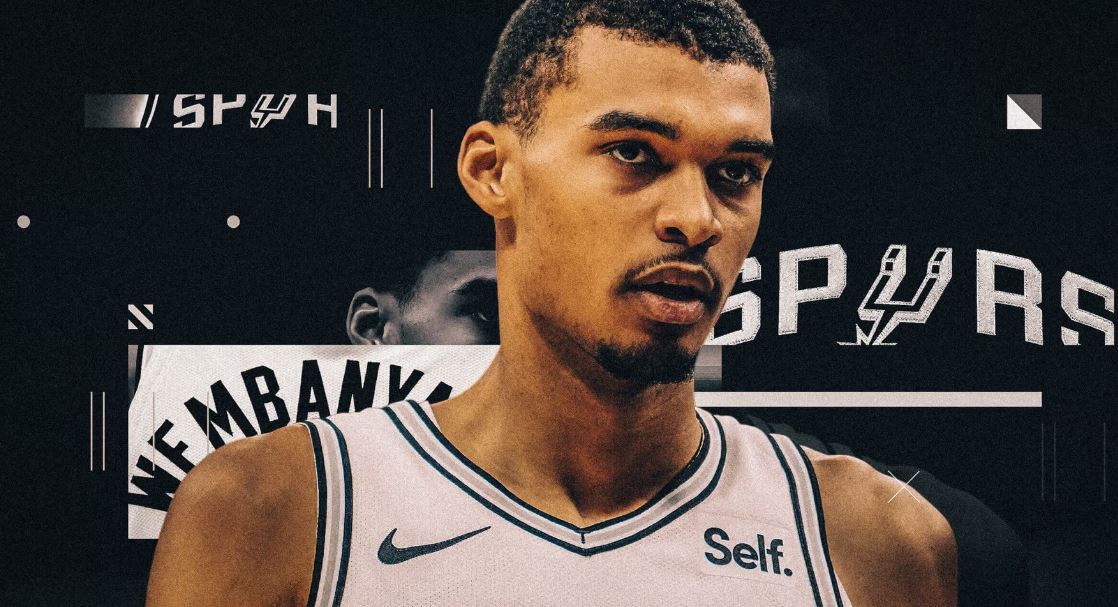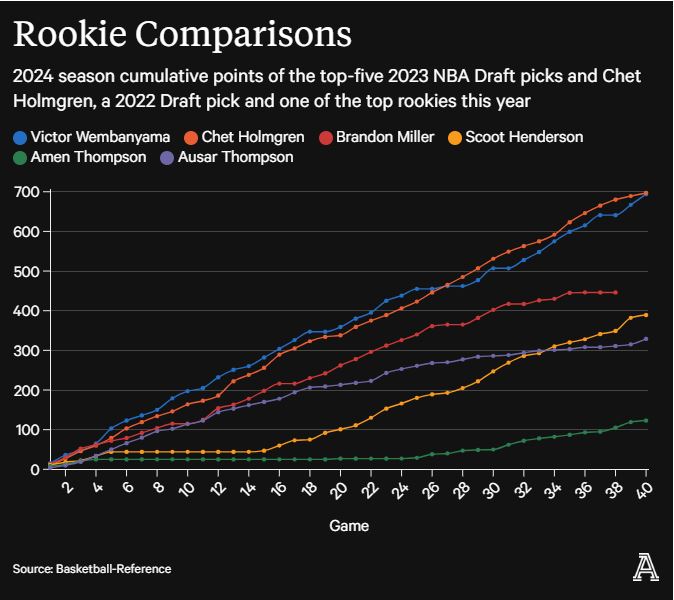
The player once described by LeBron James as not a unicorn, but “more like an alien,” came into this season as one of the most highly anticipated rookies in NBA history. Considered by most to be the best prospect to enter the league since James in 2004, Wembanyama was the top pick in the 2023 NBA Draft after a breakout season as a teenager in France, and he was the prize when the San Antonio Spurs won the draft lottery in May.
After a promising early start, including a 38-point eruption in his fifth NBA game, Wembanyama and the Spurs both had some hiccups. Teams scouted him more seriously; bigger, heavier opponents played him more physically and forced him into off-balance jumpers; and an unready Spurs roster offered him little help. San Antonio lost 18 consecutive games — a feat quickly buried when the Detroit Pistons lost a record-setting 28 straight soon after, but awful nonetheless. Meanwhile, Wembanyama put together a series of rough shooting nights, hitting only 43.3 percent in November.
Of late, however, we’ve seen more consistent flashes of his dominating potential and relatively fewer stretches of wayward shooting. Even as the Spurs have continued to struggle — the team is just 7-32 on the season — Wembanyama’s performances have steadily improved, including a dominant start to his January.
“I think you can see how he plays, and what an unbelievable talent he is,” Dallas Mavericks star Luka Dončić said earlier this season. “I really enjoy watching him.”
As we reach the halfway point of Wembanyama’s first season, now is a good time to take stock of the heralded rookie’s first season and some of the positives and negatives thus far.
Let’s start with the eye candy. No player in the league produces more highlights per minute than Wembanyama. In just half a season, he’s already generated a mind-blowing YouTube catalog, using his unprecedented combination of length and skill to perform feats we just haven’t seen before on a basketball court.
Take one random play from Monday’s game in Atlanta. Wembanyama catches the ball on the move at the 3-point line and then does something we aren’t accustomed to seeing from a 7-foot-4 player — a lefty drive into a behind-the-back-dribble into a dunk.
Watch it below. The Hawks’ Jalen Johnson played good defense that seemingly was going to force Wembanyama into a tough, contested hook shot. He stopped the rookie giant on his initial thrust left, but Wembanyama had the body control to hit the brakes, avoid a charge and change his attack angle. Johnson then slid his feet when Wembanyama effortlessly went behind the back to change direction and was on his hip as he started to leap from well outside the charge circle. Johnson looks like he’s loading up to challenge a jumper or hook shot and then … boom.
For 99 percent of players, that’s a tough, contested jumper, floater or hook shot in the lane. Except for Wembanyama, who — with his right foot planted well inside the jump ball circle — just reached up his Inspector Gadget arms toward the rim and kept extending and extending until he dunked it right over Johnson. That was one of nine dunks he had just in the second half of the Spurs’ loss. In a related stat, only nine of Wembanyama’s 557 shot attempts this season have been blocked.
Now that we have everyone excited, let me be Debbie Downer and take things down a notch. For starters, his team stinks and Wembanyama hasn’t been good enough to overcome that. While the Spurs’ recent results have been moderately better, there is no question that they’ve been a disappointment. They’re young and lack other players of Wembanyama’s caliber, but the expectation was that they’d be more competitive.

Wembanyama and point guard Tre Jones are turning into a formidable combination. (Michael Gonzales / NBAE via Getty Images)
Partly, that’s a result of lineup constructions that at times have seemed like they were designed strictly to sabotage Wembanyama’s development. The Spurs began the season by attempting to play second-year pro Jeremy Sochan at point guard, despite his showing no real qualifications or aptitude for playing the position.
They also lined up another center, Zach Collins, next to Wembanyama in the frontcourt, pushing Wembanyama further to the perimeter at both ends. The Collins-Wembanyama pairing was outscored by 11.8 points per 100 possessions in its 25-game run. Hopefully, we’ll never see it again.
Meanwhile, the Spurs seemed almost defiantly resistant to playing their one real point guard, Tre Jones, together with Wembanyama. Lineups with Jones and Wembanyama together have outscored opponents by 3.9 points per 100 possessions this season, no mean feat on a team that otherwise is bludgeoned by 9.1 per 100, yet only recently have they shared the court with any frequency.
Additionally, a series of turned ankles in December has the Spurs pulling back the throttle on Wembanyama’s court time. He reportedly will sit out in Charlotte on the front end of a back-to-back on Friday night. He hasn’t played a back-to-back since Nov. 18 and has been capped at a maximum of 27 minutes since Dec. 17.
Nonetheless, even since opening day, Wembanyama’s progress has been evident. It helps that he’s in more situations to succeed now. Slowly but surely, the Spurs have groped and stumbled their way into a more workable lineup. After a disastrous first quarter of the season, the Spurs finally moved Sochan off the ball, moved Collins out of the starting lineup and shifted Wembanyama to center. Lo and behold, keeping the 7-4 guy closer to the basket seemed to pay some dividends.
Meanwhile, it took an injury to basically every other guard on the team to make it happen, but Jones is finally starting at point guard.
Since Christmas, Wembanyama has gone to another level. In 10 games he’s scored nearly a point a minute — 232 in 242 minutes — while shooting 62.6 percent inside the arc and upping his free-throw rate, including his first two double-figure free-throw games. Defensively, he’s blocked a ridiculous 5.2 shots per 36 minutes in this stretch, and some of them have been absurd physical feats. Watch here as he swipes down at the ball as Atlanta’s Trae Young gathers it … and then magically blocks Young’s floater attempt with the same hand.
At the offensive end, the low-percentage, off-the-dribble long 2s that characterized much of his early-season output have steadily diminished. In its place are hard rim runs. Jones keeps looking for him in the air, and other Spurs have caught on to the fact that it’s impossible to overthrow Wembanyama.
Who’s up for a SLOB Lob?
When I asked where Wembanyama had improved the most, San Antonio coach Gregg Popovich offered this assessment of his progress after Monday’s game in Atlanta,
“Probably in aggressiveness,” Popovich said. “Running to the bucket and not being so concentrated on 3-point shots. Running the floor, being that target. Of course, the team has learned that they need to throw those passes, it’s not something we were used to. He’s learned how to do that and understands that it sets a tone for everybody.

Wembanyama could become the third player in Spurs history to lead the league in blocked shots as a rookie, joining David Robinson and Tim Duncan. (Brian Babineau / NBAE via Getty Images)
“Defensively he’s becoming a really good rim protector, and obviously he’s tall. And long and he should be, but he’s figuring out how to make that a definite priority. And everyone else is learning how to handle that, playing around him.”
You can see the numerical evidence for Popovich’s statement all over the place, including in some of the numbers referenced above. While Popovich focused on the 3-pointers, that quantity has changed less than Wembanyama’s overall reliance on jumpers off the dribble.
Additionally, the visual evidence for Wembanyama’s rim runs is hard to miss. He got the Hawks on a quick alley-oop following made baskets three times on Monday, again, having Jones serving as a catalyst. Watch here as Wembanyama is jostling with Atlanta’s Clint Capela under the basket at the beginning of the clip, then magically materializes at the rim at the end of it.
Popovich also credits Wembanyama’s basketball know-how for helping him progress so quickly.
“Really high IQ, understands the game intuitively,” Popovich said. “You explain something to him and he understands it. He’s just a remarkable 20-year-old.”
Wembanyama has indeed displayed a maturity beyond his years in his news conferences, even on nights when things haven’t gone well, and his response to tough coaching from Popovich also has been notable. For instance, with the Spurs struggling in Atlanta on Monday and trailing by 35 at halftime, an unhappy Popovich benched three starters — including Wembanyama — to start the third quarter. Wembanyama understood.
“The message was strong and obvious,” Wembanyama said. “He said we were being embarrassed, that we had probably the worst half we’ve had so far.”
Did Popovich say it that nicely, though?
“Aw, hell no.”
However, Wembanyama responded with a 26-point eruption after halftime that included the aforementioned dunk fest, nearly bringing the Spurs back from a gigantic deficit.
“I like to be coached, I like to be threatened and sent to the G League if I don’t play the right way. I don’t care, I like when there are consequences to my mistakes,” he said.
It doesn’t seem like a trip to Austin to play for the Spurs’ G League team will be necessary — Wembanyama will be San Antonio’s starting center for the foreseeable future — but there are still a few areas where Popovich might read him the riot act for motivation.
Wembanyama’s midrange shooting has been quite poor — just 31 percent on 2s from beyond 10 feet, according to Basketball Reference — and his 29.3 percent mark from 3 lends support to Popovich’s thoughts on his 3-point frequency. While he’s shown the touch to make those shots, it’s still a developing skill for him, not a go-to option. Even last year in France, Wembanyama would fall in love with this shot a bit too much.
If we’re nitpicking, we can point to some other things. His turnover rate has also been too high (5.5 per 100 possessions) as some of his ballhandling adventures have gotten him into tough spots. He needs to be more crafty in drawing fouls and add some lower-body strength for battles under the basket (although his Rebound Rate of 19.1 percent is very good, even among centers).
In the big picture, however, Wembanyama’s recent run of dominance, and steady improvement since opening day, points to a stratospheric endpoint when you extrapolate the graph out a few years.
“He’s going to change the game, 100 percent,” Denver Nuggets star and NBA MVP Nikola Jokić told reporters after facing him earlier this season. “He’s already on that path, so just enjoy and watch the show and let the guy change the game.”
After falling behind Oklahoma City’s Chet Holmgren early in the NBA Rookie of the Year race, Wembanyama is again asserting himself as a worthy rival in a two-horse race. And at just 20 with enviable tools, there is little question he has more long-term upside than any other player in the league.

So enjoy the ride, everyone. The back-to-back and minutes restrictions may be a momentary nuisance for fans who want to see more, but Wembanyama remains must-see TV as one of the most talented players to ever enter the league. The exciting part, now, is where the Spurs’ French prodigy continues to take his game in the second half of the season and beyond.